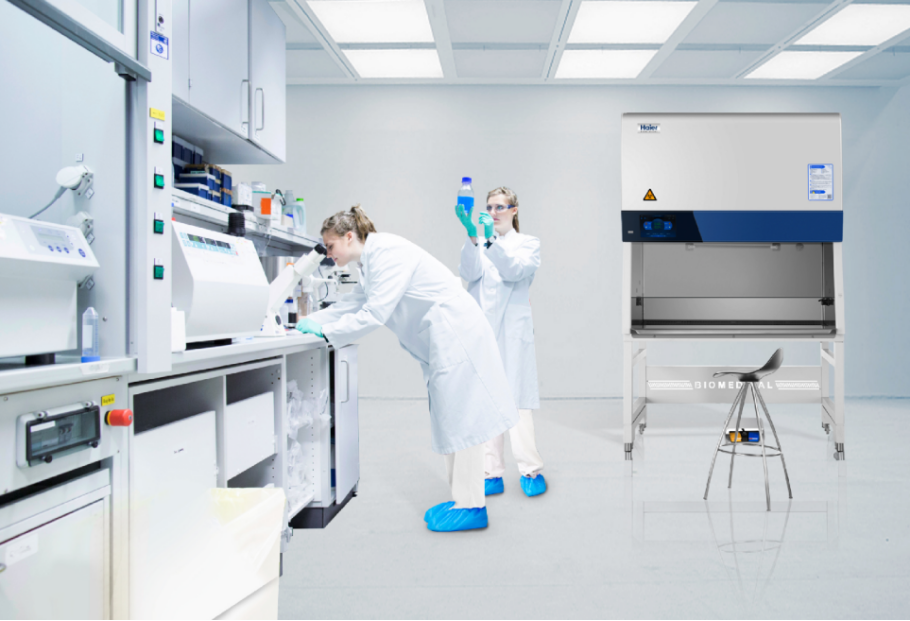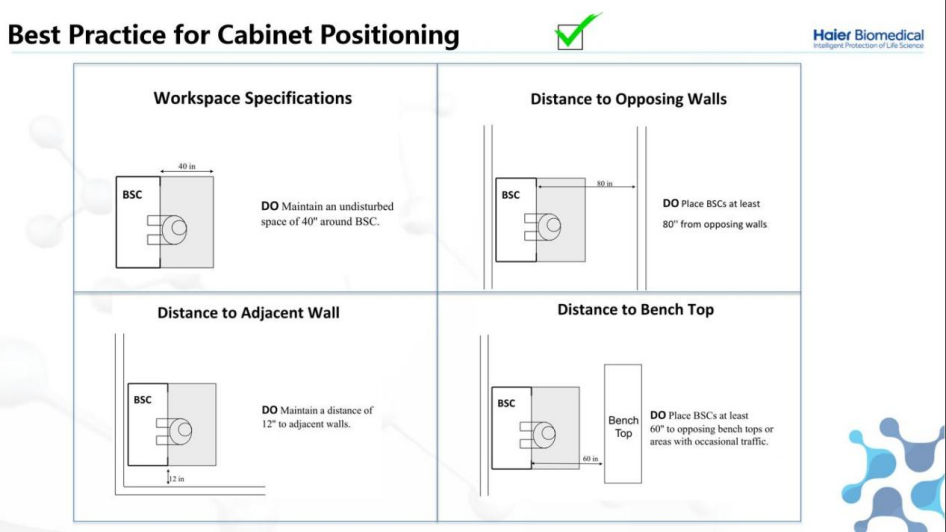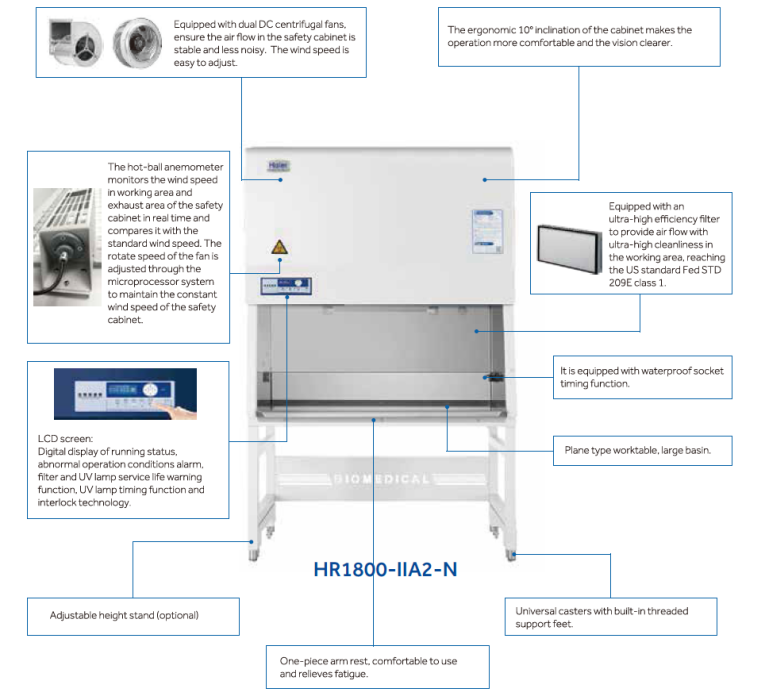With the continuous development of science and technology and the improvement of people's safety awareness, biological safety cabinets have been widely used in hospitals, research institutes, laboratories, in multiple places and industry sectors. However, as laboratory safety protection equipment, biological safety cabinets can provide safety protection for operators, samples, and the environment only when they are understood and used properly.

I.Can biological safety cabinets be replaced by clean benches?
For the moment, lots of operators mistakenly believe that clean workbenches and biological safety cabinets are similar in both appearance and function. Hence, many institutions are using clean benches in replacement of biological safety cabinets, which presents a high risk. The two are fundamentally different, especially in the experimental manipulation of some biological risk factors.
Clean benches can protect samples by blowing the purified air from the HEPA filter downward or forward through the working area to form a positive pressure area. However, as the airflow overflows through the operating window, no protection is available for operators and the environment.
Biological safety cabinets are negative pressure purification equipment. Relying on the double-layer construction, which enables the equipment to have negative pressure protection, and the two HEPA filters for filtration, they can prevent operators and the environment from being exposed to harmful aerosols produced in laboratories.
Therefore, biological safety cabinets of corresponding types shall be used in hospitals for clinical examination, diagnosis, pathological analysis, preparation of tumor drugs, and other related work, as well as in relevant biomedical research institutes and laboratories.
II. Precautions for placing a biological safety cabinet
When purchasing a biological safety cabinet, an existing laboratory generally will vacate a small space in the room to place the unit. However, a lot of problems may occur in the process of placement, and improper installation can cause contamination or harm to the operators, experimental samples, and laboratory environment.
As outside airflow may disturb the airflow in the cabinet, the biological safety cabinet shall be arranged in a place that keeps away from doors, windows, and aisles. Additionally, it shall stay away from vents, fans, air conditioning units, and air inlets.
To ensure easy access for maintenance and unimpeded air return to the laboratory, the safety cabinet shall maintain a 40" undisturbed space around and shall be kept 12" away from adjacent walls, at least 80 " away from the opposite wall, and 60" away from workbenches. In addition, above the safety cabinet, a 12-14" space shall be left so that the hot ball anemometer can accurately detect the airflow velocity at both ends of the exhaust filter and the exhaust HEPA filter can be easily replaced.
III. How to use a biological safety cabinet properly

During the use of a biological safety cabinet, correct operating procedures can protect the experimental samples from contamination.
Before the start of an experiment, the blower and lamps shall be turned on in advance to have the safety cabinet run 2-3 minutes to clear the stagnant air inside, and the door of the operating window shall be maintained at the appropriate operating height (usually 8 or 10 inches) to facilitate operations. Inside the cabinet, there shall be proper airflow. To this end, a paper towel may be placed at the opening of the window frame to test whether the airflow is suitable.
Disinfection is also very important before the experiment begins. The cabinet surface shall be wiped back and forth with a paper towel sprayed with appropriate disinfectant. During the disinfection, it is strictly prohibited to reach the head into the cabinet. To ensure a sterile environment for experiments, the experimental materials shall also be carefully wiped with disinfectants before being put into the container.
When the experiment begins, it is necessary to maintain the airflow stable in the cabinet. Movements must be slow during the operations. Where the experimental materials must be taken out, the movements shall be in the inward or outward direction rather than in the left-right direction to avoid disturbing the airflow. Another thing to note is that open flames are prohibited inside the cabinet, as the heat from the open flames will destroy the indoor airflow and the high temperature will damage the supplied HEPA filter as well.
Cleaning is necessary after each experiment. To do so, the BSC fan shall be kept running for 2-3 minutes to remove all indoor air. Then, the materials shall be wiped with appropriate chemical disinfectants, and all items shall be removed from the cabinet. Finally, the surface of the cabinet shall be wiped with appropriate chemical disinfectants to maintain a sterile environment for the safety cabinet.
Ⅳ. How to clean up the spills
All biological safety cabinet leaks due to improper operations must be handled immediately. First, the cabinet shall be kept running to accommodate aerosols; then, the spills shall be covered with paper towels. In addition, the spills shall be pushed inward in a circular manner to the center from the outer edge with paper towels coated with disinfectants (usually household bleach with a final concentration of 10%, or at least 0.5% NaOCl). Then, the surface of the biological safety cabinet shall be decontaminated again within 20 minutes. Then, the residual bleach shall be removed by rinsing with sterile water or 70% ethanol to protect the stainless-steel surface.

Haier Biomedical has made remarkable achievements in the research and development and innovation of biological safety cabinets. The product models launched by the company are widely applied in many fields, including pharmaceuticals and medical and health research laboratories. Relying on the six advantages: intelligent constant wind speed technology, safety cabinet interlocking function, filter life alarm, one-button UV lamp timer, intelligent green energy-saving mode, and airflow blocking to protect human safety, Haier Biomedical has stood out from numerous competitors. Moving forward, Haier Biomedical will continue to innovate and bring smart solutions to more countries and partners to make life better through the intelligent protection of life science.














.png)



























